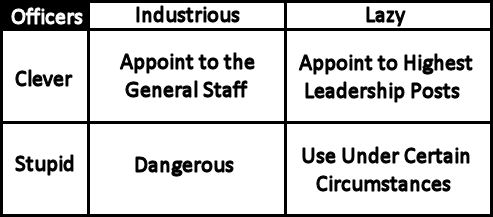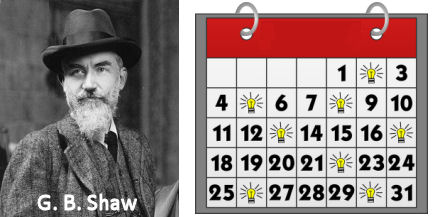Helmuth von Moltke the Elder? Erich von Manstein? Kurt von Hammerstein-Equord? Douglas MacArthur? Frederick the Great? Apocryphal?

Question for Quote Investigator: In self-help books I have repeatedly seen a two-by-two matrix used to evaluate individuals. The four elements in the matrix were labeled: Brilliant & Lazy, Brilliant & Energetic, Dumb & Lazy, and Dumb & Energetic. Curiously, the brilliant and lazy were extolled above all others.
Sometimes a different vocabulary was employed. Brilliant was replaced by smart, bright, clever, or intelligent. Energetic was replaced by industrious or diligent. Dumb was replaced by stupid.
This four-class categorization has been ascribed to several German generals, e.g., Helmuth von Moltke, Erich von Manstein, Carl von Clausewitz, and Kurt von Hammerstein-Equord. Would you please explore the origins of this matrix?
Reply from Quote Investigator: The earliest evidence located by QI appeared in January 1933 in a periodical called “Army, Navy & Air Force Gazette” based in Great Britain. A passage attributed to German General Kurt von Hammerstein-Equord described the placing of officers into four classes.
The text was reprinted under the title “Selecting Officers” in the “United States Naval Institute Proceedings” in March 19331 and in the “Review of Military Literature: The Command and General Staff School Quarterly” in September 1933.2 Boldface has been added to excerpts:
General Freiherr von Hammerstein-Equord, the present chief of the German Army, has a method of selecting officers which strikes us as being highly original and peculiarly un-Prussian. According to Exchange, a Berlin newspaper has printed the following as his answer to a query as to how he judged his officers: “I divide my officers into four classes as follows: The clever, the industrious, the lazy, and the stupid. Each officer always possesses two of these qualities.
Those who are clever and industrious I appoint to the General Staff. Use can under certain circumstances be made of those who are stupid and lazy. The man who is clever and lazy qualifies for the highest leadership posts. He has the requisite nerves and the mental clarity for difficult decisions. But whoever is stupid and industrious must be got rid of, for he is too dangerous.”
Here are additional selected citations in chronological order.
Continue reading “Quote Origin: The Person Who is Clever and Lazy Qualifies for the Highest Leadership Posts”